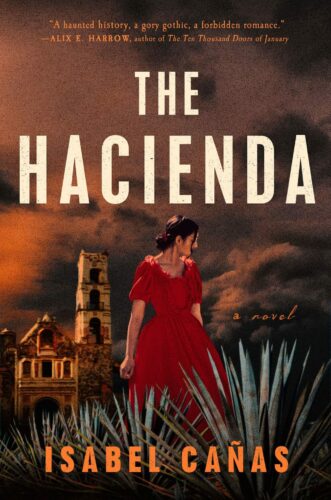Haunted Haciendas and Dark Priests
Author: Isabel Cañas
The Hacienda promises a gothic historical romp with ghosts, similar to Rebecca and Mexican Gothic. Instead, what it delivers is a weird mélange of half formed ideas set against a fantastic background and premise, but without the characters and fortitude to sustain the atmosphere and intention.
It begins with a war. This war, like all wars, has its sides, and Beatriz’s father (a key general) was on the losing side. Ousted from her formerly good life, Beatriz and her windowed mother are now forced into near servitude by a sharp-tongued aunt. It’s not a good life. Beatriz misses her finer things. She misses being the general’s daughter. She misses money and privilege. And she still remembers her father’s brutal execution, still holds onto the hate for the winning side. But she reasons, she must survive. And so, she makes a deal. She agrees to marry recently widowed and extremely wealthy Rodolfo. Rodolfo is, naturally, a scion of the winning side in the war. It’s a betrayal of her dead father, of her values, but it means survival. It means her own house, servants, nice dresses, a place to take her ailing mother. And so, Beatriz rationalizes as she travels with her new hubby to Hacienda San Isidro, ignoring the rumors about Rodolfo’s previous wife and her sudden and strange death.
But, of course, Hacienda San Isidro has issues. These issues go far beyond its dark, crumbling façade. The former mistress, Doña Solórzano, is lurking in the shadows, waiting to enact some vengeance from beyond the grave. Other than Beatriz and her husband, no one will enter the house at night. The kitchen servants paint strange symbols and burn copal during the day. Rodolfo’s outlandish sister, the drunken and brazen Juana, claims that this fear is mere imagination, yet she too avoids the house and spends her days working in the fields, overseeing the men, drinking, and gambling.

Image by Enrique Meseguer from Pixabay
Beatriz, like everyone who ever proceeded her in a ghost centered horror novel, refuses to leave. She fought for this house, this new life, after all. Even though her mother refuses to converse with her, refuses to accept the sell-out and visit, Beatriz will not renege. She will have this house. Enter the strange local priest, Padre Andrés, who has his own secret ties to this unhappy house and an unconventional approach to exorcisms.
I really wanted to like this book. After all the hype, I immediately pre-ordered the hardcover, knowing I would fall in love with it as I did Rebecca and Mexican Gothic. Then, during a family trip, I decided I could no longer wait and bought the Audible version. I was going to indulge myself.
It starts well. There is an ominous atmosphere, the strange unspoken fragility of a relationship where violence and hate thrums beneath the polite surface. There is a suitably ruined, isolated mansion, a mean sister-in-law who knows more than she is telling, and hallucinations riddled with meaning and blood. But the atmosphere cannot hold up against the inconsistencies and omissions.
First, unless you happen to be well versed in Mexican history, the war and its scope of pain is completely lost. We are told, and therefore accept, that there are bad feelings. But the entire war and its trauma feel more like an aside than a key, character defining historical event. After all, the war and its repercussions lead to Beatriz’s decision and her remaining family’s betrayed reaction. A few more chapters to layout the what and the why of the war, to take the history out of the outline phase and show that living, breathing people went through this, that it upended real lives and in its wake left devastation and disquiet is key to understanding the characters and their tenuous world. Without that, much is lost in translation.
Second, Beatriz isn’t entirely likable. I never hated her, but I never empathized with her either. All this, just for a house? Especially when Rodolfo told her that she could travel with him or live in the city house. Girl, the hacienda is haunted AF. Leave already. Even when Beatriz starts to seriously suspect that some hardcore violence left this haunted imprint, violence that will inevitably repeat, she still stays. Her objection – that she gave up everything for this old hunk of wood – doesn’t resonate. Perhaps it would if we heard more about the degradations of the aunt, about her life before the war. But we don’t, so her reasoning falls flat and all we can say is, “it’s your own fault,” and sigh, turning a page, waiting for her to take more stupid risks. And honestly, the house doesn’t even sound cool enough to make us want Beatriz to take the risk.
It’s fairly obvious early on what happened to Dona Solórzano and who the perpetrator is. The ghost straight up tells us in the beginning. But Beatriz remains, somehow, unable to comprehend the unusually clear beyond-the-grave message (hint, the ghost actually SAYS the name of her murderer multiple times early on). No wonder this ghost is so mad.
Padre Andrés is another issue. While he claims to be a priest, and sort of is sometimes, he is really a witch in disguise, hiding in plain sight. He mentions that this is dangerous, that if anyone knew his life would be forfeit, but again, we don’t get a sense of this danger. Is the Inquisition active (they are briefly mentioned)? And, if this is such a great secret, why does everyone in this town know that he is a witch and rely on his spells? And this isn’t a risk??? Literarily, is there anyone he doesn’t tell?

Image by Enrique Meseguer from Pixabay
Padre Andrés is also problematic from a Christian perspective. This is one of those novels that manages to Christian bash in the middle of the narrative. Was this necessary? If you wanted to go down the road of spells and drawings and witchcraft, then why make this man be a priest as well, unless the intent was deliberate offense?
The love story between Beatriz and Andrés is completely stiff and unbelievable. Beatriz, being busily absorbed with herself, is not even slightly shocked or curious that her pastor is actually a witch. In similar form, Andrés is not the least bit interested in Beatriz and her life. Yet, we are supposed to believe that they are desperately, recklessly impassioned. Really? How do they have time in between their numerous failed spells (I mean seriously Andrés, get it together), travails around a dark house (bring a candle already), and endless naval gazing. Andrés is haunted by his own inner darkness, which never gets discussed or clarified at all. Beatriz is busy thinking about her house, and just a tad worried that new hubby might, you know, murder her in cold blood. Perfect time for an ill-fated romance.
Ok, ok, but why the pretty decent rating anyway? Well, this was difficult for me, because for all the many, many, many faults, the story wasn’t horrible. It did have an atmosphere. It had a pretty decent idea, and the setting was good. Some of the scenes were creepy (I love the ghost cadaver in the wall), and I’m just a fan of the gothic idea. Nevertheless, I probably rated this one a little too nicely. The more I read, the more I can tear apart a book and still think it was an “ok read.” And this was just that, an ok read. I certainly won’t read it again or go out of the way to find more from this author, but I am not hopping mad and demanding my time and money back either. Make of that whatever you will. This one goes straight to the Little Free Library, clearing up shelf space for more memorable books.
– Frances Carden
Follow my reviews on Twitter at: https://twitter.com/xombie_mistress
Follow my reviews on Facebook at: https://www.facebook.com/FrancesReviews
- Book Vs Movie: The Shining - April 6, 2020
- Thankful For Great Cozy Mysteries - December 13, 2019
- Cozy Mysteries for a Perfect Fall - October 20, 2019



